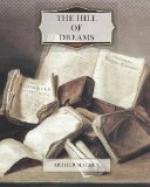Lucian went slowly, but not discreditably, up the school, gaining prizes now and again, and falling in love more and more with useless reading and unlikely knowledge. He did his elegiacs and iambics well enough, but he preferred exercising himself in the rhymed Latin of the middle ages. He like history, but he loved to meditate on a land laid waste, Britain deserted by the legions, the rare pavements riven by frost, Celtic magic still brooding on the wild hills and in the black depths of the forest, the rosy marbles stained with rain, and the walls growing grey. The masters did not encourage these researches; a pure enthusiasm, they felt, should be for cricket and football, the dilettanti might even play fives and read Shakespeare without blame, but healthy English boys should have nothing to do with decadent periods. He was once found guilty of recommending Villon to a school-fellow named Barnes. Barnes tried to extract unpleasantness from the text during preparation, and rioted in his place, owing to his incapacity for the language. The matter was a serious one; the headmaster had never heard of Villon, and the culprit gave up the name of his literary admirer without remorse. Hence, sorrow for Lucian, and complete immunity for the miserable illiterate Barnes, who resolved to confine his researches to the Old Testament, a book which the headmaster knew well. As for Lucian, he plodded on, learning his work decently, and sometimes doing very creditable Latin and Greek prose. His school-fellows thought him quite mad, and tolerated him, and indeed were very kind to him in their barbarous manner. He often remembered in after life acts of generosity and good nature done by wretches like Barnes, who had no care for old French nor for curious meters, and such recollections always moved him to emotion. Travelers tell such tales; cast upon cruel shores amongst savage races, they have found no little kindness and warmth of hospitality.
He looked forward to the holidays as joyfully as the rest of them. Barnes and his friend Duscot used to tell him their plans and anticipation; they were going home to brothers and sisters, and to cricket, more cricket, or to football, more football, and in the winter there were parties and jollities of all sorts. In return he would announce his intention of studying the Hebrew language, or perhaps Provencal, with a walk up a bare and desolate mountain by way of open-air amusement, and on a rainy day for choice. Whereupon Barnes would impart to Duscot his confident belief that old Taylor was quite cracked. It was a queer, funny life that of school, and so very unlike anything in Tom Brown. He once saw the headmaster patting the head of the bishop’s little boy, while he called him “my little man,” and smiled hideously. He told the tale grotesquely in the lower fifth room the same day, and earned much applause, but forfeited all liking directly by proposing a voluntary course of scholastic logic. One barbarian




